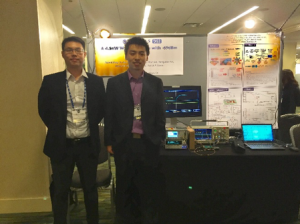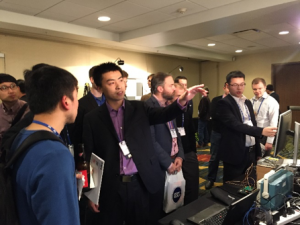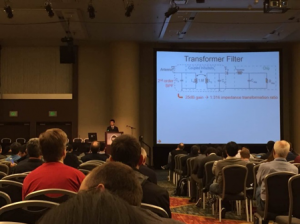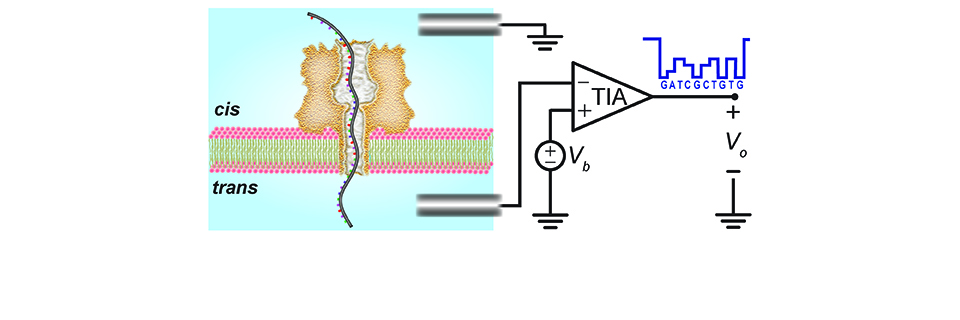Haowei’s work “A 4.5nW Wake-Up Radio with -69dBm Sensitivity” was accepted for presentation and a demo at the IEEE International Solid-State Circuits Conference (ISSCC) in San Francisco, California.



Haowei’s work “A 4.5nW Wake-Up Radio with -69dBm Sensitivity” was accepted for presentation and a demo at the IEEE International Solid-State Circuits Conference (ISSCC) in San Francisco, California.



Congratulations to Somok for winning 2nd place in the poster competition at the Center for Wearable Sensor Summit for his work on “A Digitally Assisted Dynamically Reconfigurable Analog Front-End with Data-Dependent Power Reduction for Physiological Sensing Applications!”

Our mHelath research was featured in the Center for Wireless Communications (CWC) newsletter. Read about it here.
Prof. Hall gave a talk at the Google Ara Developers Conference, watch it here.
Alex (poster) and Edwin’s (oral) work was accepted for presentation at BioCAS 2014 in Lausanne, Switzerland.


This project aims to integrate CMOS electronics with a versatile single molecule detector, the nanopore. Biomolecules, such as deoxyribonucleic acid (DNA) or proteins, can be guided through a nanoscale aperture (referred to as a nanopore) one molecule at a time, resulting in signatures that reveal characteristics of the passing molecule. As single-stranded DNA translocates through a nanopore, each nucleotide induces a blockage in the ionic channel, creating a unique current signature. However, the fast translocation speed of 1-10 nucleotides per microsecond and small current changes of 1-10 picoampere, which are superimposed on a much larger baseline current of 1000 picoampere, pose significant technical challenges on the measurement circuitry design. In the Hall group, we are researching how to design low-noise and high-speed transimpedance amplifiers to sense these minute current signatures. An inexpensive single molecule biosensor will have a tremendous impact in areas as diverse as medicine and health, both domestically and abroad.

With a significant increase in the availability of portable and network connected devices over the last few decades, the infrastructure already exists to be able to integrate medical diagnostic tools with mobile technology. Taking advantage of this opportunity, the Hall research group is working on developing low-cost, point-of-care (POC) biosensor devices, which allow users to test biological samples, analyze data, and aggregate the results for study by medical professionals all without the need for a centralized laboratory or bulky and expensive equipment. There are several projects currently in progress that fall under the umbrella of mobile Health (mHealth).
With the focus on leveraging the functionality and widespread use of the smartphone, especially in developing countries, we are designing two versions of a low-cost smartphone-based biosensor. The first is a low-power, single-channel potentiostat to be used for electrochemical assays and the second is a wireless, multiplexed version with added sensors. We are also working in partnership with industry to integrate biosensor modules directly with smartphone hardware. On the transducer and bio-chemistry side, we are investigating novel methods of functionalizing electrodes that decrease the cost per disposable test strip making these POC devices more practical. Finally, the compact and low-cost nature of electrochemical techniques has allowed us to combine our electrochemical biosensors with optical biosensors for improved detection on Lab-on-Chip type devices.

![]() The BioEE group is happy to be participating in the Benefunder project! Benefunder is a marketplace that allows donors to find, fund, and follow researchers and other university initiatives in a simple, efficient way.
The BioEE group is happy to be participating in the Benefunder project! Benefunder is a marketplace that allows donors to find, fund, and follow researchers and other university initiatives in a simple, efficient way.
Benefunder partners with top universities to gain access to top researchers and initiatives across all disciplines to ensure that your donations go to the intended use. Researchers create and manage their profiles on our site, which must be approved internally before getting published. This way, you always get the most up-to-date information regarding their work and can rest assured knowing that all our causes are vetted.
Check out our profile here!